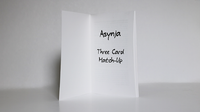Asynaja by Fraser Parker
This is Fraser's solution to the 3 cards match up routine made famous by Chan Canasta.
It allows you to perform this impossible feat of coincidence without relying on chance or the type of boldness that sometimes caused even the great Canasta to fail.
In fact, Fraser's version is entirely solid and is practically self-working!
The effect is as follows.
Two decks of cards of contrasting color or design are placed on the table in front of a spectator, and they are instructed to choose either deck. They then overhand shuffle whichever deck they choose whilst the performer does the same with the deck which is left for them. The performer and spectator then swap decks and overhand shuffle the packets again to ensure they are thoroughly mixed and no control of any of the cards could be taking place. They then place each of their decks under the table or behind their back and without looking turn over the top three cards and cut the deck. The decks are swapped back and with the face down decks lifted towards themselves both the performer and spectator slowly spread to whichever cards happen to have been turned face up by the other person.
The spectator is now given a completely free choice which cards they want to place where on their person. The performer does the same with their face up cards. The first card chosen by the spectator is placed in either their left or right pocket. The second choice of card goes in whichever pocket is left over and the last card is held facing their chest or can be placed into a breast pocket if they have one, as was the case in the original effect performed by Canasta.
Everything is as fair as can be.
However, when the spectator takes out each of their cards, they are seen to match perfectly with the cards the performer also has hidden away. Each of the cards match perfectly in value and suit as well as somehow happen to correspond correctly in terms of the random placements for each of the cards that were chosen by the spectator.
The illusion is perfect!
Single deck versions are also taught.
It allows you to perform this impossible feat of coincidence without relying on chance or the type of boldness that sometimes caused even the great Canasta to fail.
In fact, Fraser's version is entirely solid and is practically self-working!
The effect is as follows.
Two decks of cards of contrasting color or design are placed on the table in front of a spectator, and they are instructed to choose either deck. They then overhand shuffle whichever deck they choose whilst the performer does the same with the deck which is left for them. The performer and spectator then swap decks and overhand shuffle the packets again to ensure they are thoroughly mixed and no control of any of the cards could be taking place. They then place each of their decks under the table or behind their back and without looking turn over the top three cards and cut the deck. The decks are swapped back and with the face down decks lifted towards themselves both the performer and spectator slowly spread to whichever cards happen to have been turned face up by the other person.
The spectator is now given a completely free choice which cards they want to place where on their person. The performer does the same with their face up cards. The first card chosen by the spectator is placed in either their left or right pocket. The second choice of card goes in whichever pocket is left over and the last card is held facing their chest or can be placed into a breast pocket if they have one, as was the case in the original effect performed by Canasta.
Everything is as fair as can be.
However, when the spectator takes out each of their cards, they are seen to match perfectly with the cards the performer also has hidden away. Each of the cards match perfectly in value and suit as well as somehow happen to correspond correctly in terms of the random placements for each of the cards that were chosen by the spectator.
The illusion is perfect!
- No gaffed decks.
- No gimmicks.
- No dual reality or strange language.
- No psychological forces.
- No multiple outs.
Single deck versions are also taught.






